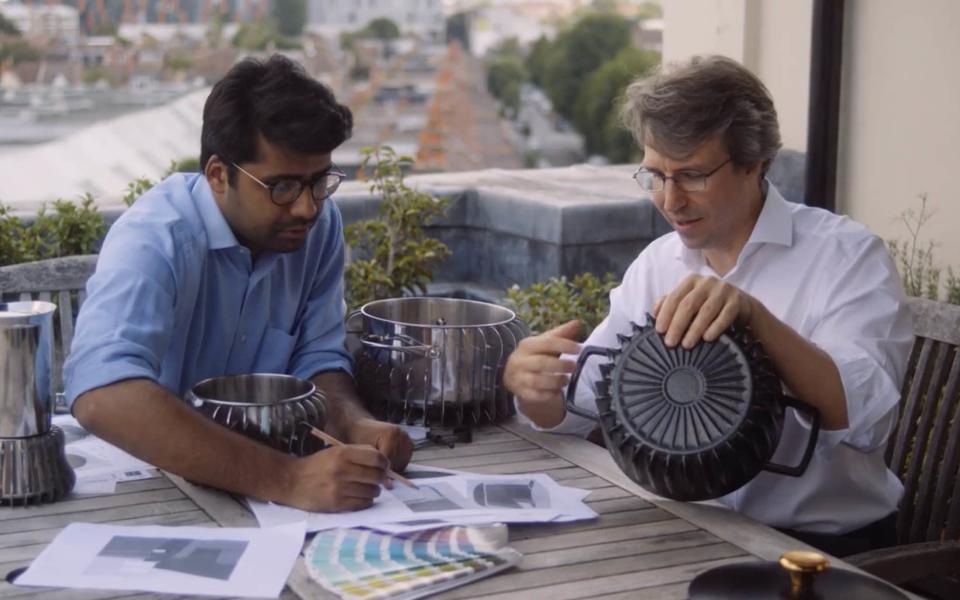A rocket scientist from the University of Oxford has invented a new type of cast iron pan using thermodynamics that could persuade home cooks away from their Le Creuset.
The enamelled cast iron Dutch oven with fins around the outside was inspired by heat transfer methods of jet engines and rocket design and leads to quicker cooking.
The fins around the pans are designed to improve heat distribution and improve efficiency. Heat that would otherwise be lost around the outside of a pan can be captured and used to create an “oven-like” effect.
The pan is produced by FireUp – a company that received £10,000 from the University of Oxford’s Innovation incubator programme which gives funding to entrepreneurs in exchange for a percentage of royalties.
ADVERTISEMENT
Raghav Agarwal, the chief executive of FireUp, told The Telegraph: “The patent underpinning this unique finned design was developed by Professor Thomas Povey, who applied his research into high-efficiency cooling systems for next-generation jet engines to an everyday object that transfers heat: domestic cookware.”
FireUp is a clear competitor in the cast iron market, which has long been dominated by French giant Le Creuset.
Le Creuset, the prestige French cookware brand which turns 100 next year, is famed for its colours, quality and lifetime warranty. The company, based in Fresnoy-le-Grand in northern France, manufactures pots which cost up to £600 and come in a range of colours.
A recent Le Creuset warehouse sale in Hampshire was so popular that people flocked to the town of Andover from across the UK to get bargain prices, with police called in to help cope with all the extra traffic.

FireUp makes its products in France, has an eye-catching design, and offers a lifetime warranty at a similar price point – £250 for a five-litre pan – but Mr Agarwal rejects any comparisons to Le Creuset or any other brands.
ADVERTISEMENT
“Respectfully, we don’t think we are competing with legacy brands,” he said. “For context, our innovation design bears similarity to how Apple disrupted Nokia and Blackberry with their iPhone touchscreen innovation.”
He added: “The product is not positioned to compete with existing large legacy companies. We believe that there has been zero innovation in cookware design, for almost a hundred years.
“The market offers nothing more than the same product in different colours and sizes, hyper-marketed to appear innovative, but in reality, it’s just lazy rebranding of the same product.
“Most importantly, no new product focuses on improving the design or scientifically enhancing efficiency, to save both gas and time in everyday cooking.”

According to Prof Povey in his patent, the fin technology of the FireUp pans “provides a heat transfer structure in good thermal contact with the side wall of the vessel”.
ADVERTISEMENT
“Heated air and any flame which travels up the side of the vessel can be captured by the heat transfer structure and the heat conducted into the walls of the vessel.
“The increased heat energy available for hearing the contents of the verses thus greatly increases the efficiency of the heating process.”
It is claimed that on a gas hob, the FireUp pan technology increases heating efficiency to 80 per cent from 30 per cent.
The benefit is most noticeable on a gas hob, the patent states, as it can maximise the heat plume that the burner sends around and above the pan.

Mr Agarwal said: “Our signature fin technology was developed based on heat exchange theory used in rocket design.
“It allows more even heat distribution and superior efficiency by guiding the flame around the pan and into the fins.
“The carefully designed fins also retain heat and create an oven-like even cooking experience. They also make the pan look unique and beautiful on your table.”
ADVERTISEMENT
An Oxford University Innovation spokesperson said: “The FireUp cookware technology is an example of how universities can support technologies to reach the market through programmes such as Oxford University Innovation’s Student Entrepreneurship Programme (StEP).
“By providing support to entrepreneurs and access to innovative technologies and world-class expertise, we try and ensure that the outputs of Oxford’s research can make an impact both economically and socially.”
EMEA Tribune is not involved in this news article, it is taken from our partners and or from the News Agencies. Copyright and Credit go to the News Agencies, email news@emeatribune.com Follow our WhatsApp verified Channel



